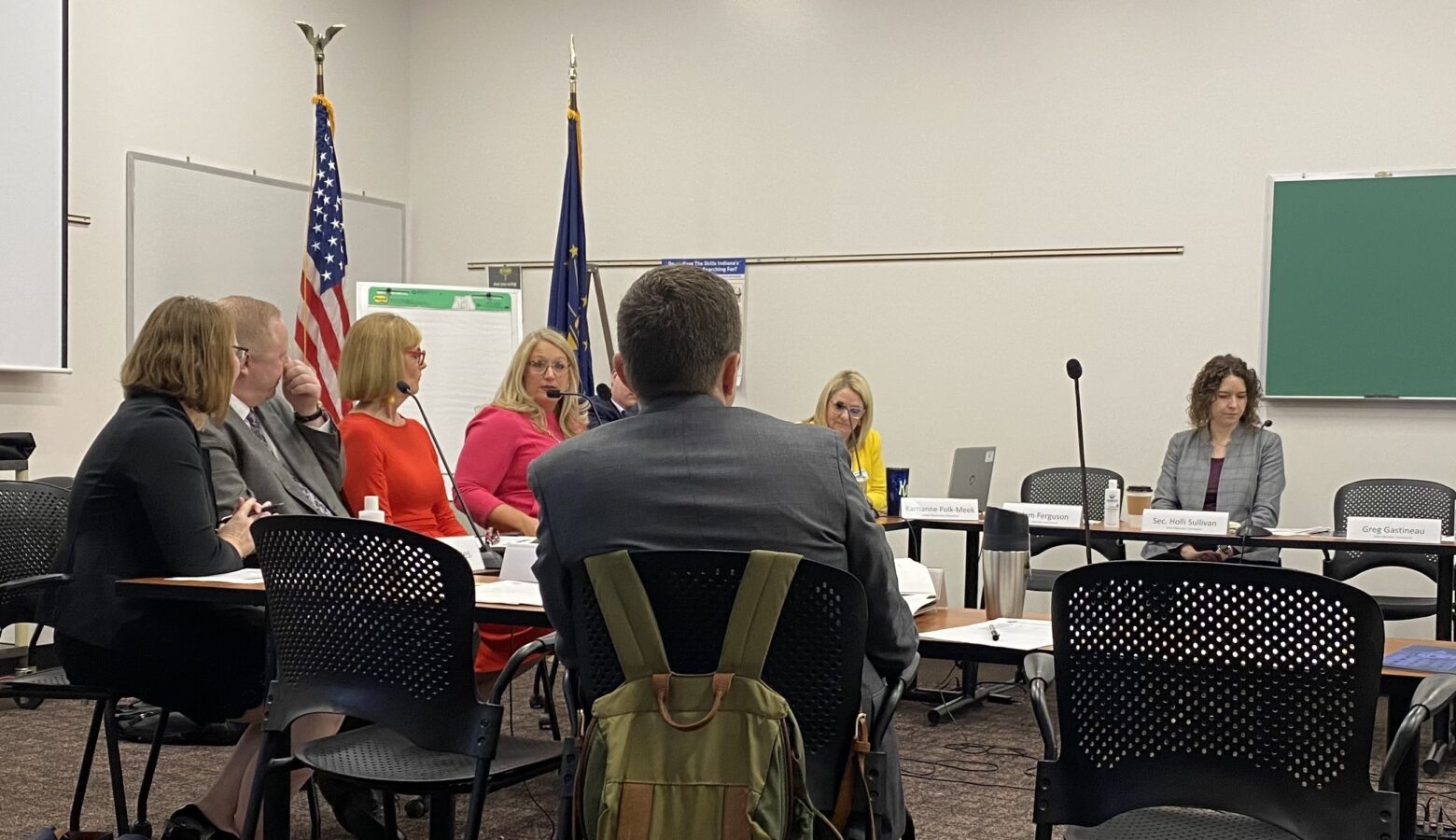New sixth grade course will build Indiana students’ civics education foundation

The proposed civics education standards for middle school students were discussed during a public meeting Tuesday of the commission that authored the guidelines. Beginning in 2023, middle school students will be required to take one semester of civics before starting high school.
The draft standards are based on three indicators: the foundations and function of government, and role of citizens. The curriculum aims to help students better understand how government works and to increase their engagement in local, state and national issues.
“When you take a look at the overall voting of our state, it does not really rank well,” said Sen. J.D. Ford (D-Indianapolis).“And so the thought with this civics commission is to start, in sixth grade, to give our students a foundation so that when they progress through school, and even come out of high school, that they are good, productive members of our society.”
Only 65 percent of registered Hoosiers voted in the 2020 General Election.
The Indiana State Board of Education is expected to vote on the civics standards in June. The board must vote on the standards by July 1. After that date, the standards can only be changed by the General Assembly.
The proposed standards
Indiana’s curriculum standards for all subjects are reviewed every six years. Indiana’s current math, English/language arts and social studies standards were updated in 2020.
The commission had the ability to enforce the requirement at any point while students were in middle school. But the commission decided to require the course during the second semester of sixth grade in order to allow more flexibility in the amount of educators who are able to teach the course. This also ensures that students take the course even if they switch schools.
The standards were created based on feedback from educators, as well as over 200 public commenters in January.
Students will discuss topics such as the English Bill of Rights, the principles and purposes of government, and civic responsibility. That includes discussions about the three branches of government, elections and property taxes.
The civics course aims to provide students with an initial foundation of civics education, which they will build upon throughout their K-12 careers. For example, some of the topics taught during the civics course will be covered again during students’ senior year government class.
Karrianne Polk-Meek, the 2021 Indiana middle school principal of the year and the director of teaching and learning for the Indiana Department of Education, helped write the standards. She said the standards do not include concrete, specific examples of topics to cover in order to allow individual school districts – which create the actual curriculum – to include examples based on students’ needs and community input.
“Avoiding those specific topics, or outlining specific topics, allows for schools to make decisions that are important to their community,” Polk-Meek said.
But some lawmakers, such as Rep. Tony Cook (R-Cicero), had concerns about whether or not the standards will cover the topics he hoped would be addressed when he initially authored the bill. During the meeting he said he hoped the standards in the elementary level, as well as other grades, would list requirements to talk about landmark Supreme Court cases such as Brown v. Board of Education, Dred Scott v. Sanford and Roe v. Wade, which set off protests and intense political and health debates over the past week after a leaked draft Supreme Court opinion showed the law might be overturned.
But Polk-Meek trusts that teachers will be able to decide what to teach while also empowering kids to be thoughtful thinkers.
“What happens for our social studies teachers, and all teachers in the state of Indiana, is that they are constantly and consistently aware of the impact of their words and the value of their lessons,” Polk-Meek said. “Managing or thinking about the complexity of the students that they serve and the community that they serve is inherently one of those things that teachers have to do every day.”
Creation of the civics course requirement
Gov. Eric Holcomb signed a law in 2021 to require civics education. The legislation came out of the Civics Education Task Force, chaired by Lt. Gov. Suzanne Crouch, that sought to find ways to improve civic education. All public, charter and state accredited private schools must offer a civics course to students starting in the 2023-2024 academic year. Students may take the course at any time between sixth and eighth grade.
The law also created the Civics Education Commission – a 16-member committee that’s responsible for creating the curriculum standards.
The Civics Education Commission includes the following members:
- Brad Balch, dean emeritus at Indiana State University
- Charles Dunlap, president and CEO of the Indiana Bar Foundation
- Adam Ferguson, a teacher at Plainfield High School
- Greg Gastineau, a teacher at Hamilton Southeastern High School
- Joe Jordan, president and CEO of the Boys & Girls Clubs of Fort Wayne
- Emily Tracy, superintendent of Brown County Schools
- Phillip VanFossen, Director and James F. Ackerman distinguished professor of social studies education at Purdue University
- Indiana Lt. Governor Suzanne Crouch or designee
- Indiana Secretary of Education Katie Jenner or designee
- Indiana Secretary of State Holli Sullivan or designee (Designee – Rachel Hoffmeyer)
- Indiana Supreme Court Chief Justice or designee (Designee – Justin Forkner)
- Indiana State Rep. Tonya Pfaff
- Indiana State Rep. Tony Cook
- Indiana State Sen. Dennis Kruse
- Indiana State Sen. J.D. Ford
Contact WFYI education reporter Elizabeth Gabriel at egabriel@wfyi.org. Follow on Twitter: @_elizabethgabs.

